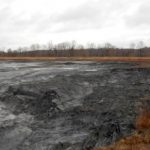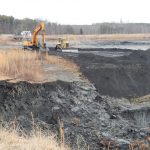To comply with a federal court ruling, the U.S. Office of Surface Mining Reclamation and Enforcement restored an earlier version of a rule meant to protect water quality and stream channels from coal mining waste.
Blog Archives
Regulators Restore 1983 Stream Protection Rule
Alpha Agrees to Water Pollution Settlement
Alpha Natural Resources agreed to a settlement in a 2012 lawsuit, brought by the Sierra Club and other environmental groups, regarding high levels of conductivity found in streams at two of its mountaintop removal mining complexes in West Virginia.
Danger still looms over the Dan River
 In the wake of the Dan River coal ash spill, which spewed 39,000 tons of the toxic waste into the scenic river, much attention has been given to the problems of leaky, unlined coal ash pits across North Carolina. What hasn’t received adequate attention is another menacing threat just upstream from the site of last year’s spill.
In the wake of the Dan River coal ash spill, which spewed 39,000 tons of the toxic waste into the scenic river, much attention has been given to the problems of leaky, unlined coal ash pits across North Carolina. What hasn’t received adequate attention is another menacing threat just upstream from the site of last year’s spill.
To protect or prosecute polluters?
 Kentucky regulators recently filed an administrative complaint against Frasure Creek Mining for hundreds of violations of the Clean Water Act. As we wait to see if the state is going to take its responsibility to protect the people and water of Kentucky from pollution seriously, Appalachian Voices will continue to do whatever we can to ensure that Frasure Creek and other polluters are held accountable.
Kentucky regulators recently filed an administrative complaint against Frasure Creek Mining for hundreds of violations of the Clean Water Act. As we wait to see if the state is going to take its responsibility to protect the people and water of Kentucky from pollution seriously, Appalachian Voices will continue to do whatever we can to ensure that Frasure Creek and other polluters are held accountable.
EPA finalizes long-awaited coal ash regulations

The day we’ve been waiting for has finally come. No, not Friday — the U.S. Environmental Protection Agency to release its long-awaited coal ash rule. But, as expected, the EPA’s new rule does not go far enough to truly fix the major pollution problems associated with coal ash including contamination of waterways and drinking water supplies.
Fighting Mountaintop Removal During the Obama Years

In 2009, representatives of the new Obama administration repeated that “the administration will do what the science calls for.” In Appalachia, the science calls for an end to mountaintop removal coal mining. Six years later, mountaintop removal is still happening.
Corruption and Enforcement Failures Raise Concern for Clean Water

Recently uncovered conspiracies to violate the Clean Water Act have heightened concerns about corruption in central Appalachia and the effectiveness of state agencies responsible for enforcing the law.
Hey North Carolina, New York just banned fracking
 New York’s debate over whether or not to allow fracking came to a close today when Gov. Andrew Cuomo sided with the state’s top public health and environmental officials in calling for a ban on the practice. The announcement was exceptional for the much-needed truth it inserts into the fracking fight that could, just maybe, help other states come to their senses.
New York’s debate over whether or not to allow fracking came to a close today when Gov. Andrew Cuomo sided with the state’s top public health and environmental officials in calling for a ban on the practice. The announcement was exceptional for the much-needed truth it inserts into the fracking fight that could, just maybe, help other states come to their senses.
Coal ash cleanup still contested in North Carolina
 As the U.S. Environmental Protection Agency puts the final touches on the first-ever federal regulation of coal ash, North Carolina’s response to the Dan River spill is still hotly contested and new controversies about the best ways to clean up coal ash are beginning to emerge.
As the U.S. Environmental Protection Agency puts the final touches on the first-ever federal regulation of coal ash, North Carolina’s response to the Dan River spill is still hotly contested and new controversies about the best ways to clean up coal ash are beginning to emerge.
Nothing to see here
 The Kentucky Energy and Environment Cabinet’s dismissive attitude toward the severity of mining pollution in the state is unsurprising after citizen cases against one coal company exposed the agency’s utter failure to enforce the Clean Water Act. But the jig is up. The Cabinet should stop trying to cover up its incompetence and actually do its job.
The Kentucky Energy and Environment Cabinet’s dismissive attitude toward the severity of mining pollution in the state is unsurprising after citizen cases against one coal company exposed the agency’s utter failure to enforce the Clean Water Act. But the jig is up. The Cabinet should stop trying to cover up its incompetence and actually do its job.

